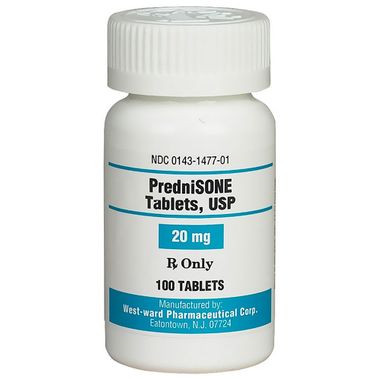Prednisone: Health Benefits & Risks
What are the health benefits of Prednisone?
Prednisone is a corticosteroid medication that is used to treat a variety of conditions, including inflammation, allergic reactions, autoimmune disorders, and certain types of cancer. It works by reducing inflammation and suppressing the immune system. Some of the health benefits of prednisone include:
- Anti-inflammatory effects: Prednisone is highly effective in reducing inflammation in the body. It can help reduce swelling, redness, and pain associated with inflammatory conditions such as arthritis, bursitis, and tendonitis.
- Allergic reactions: Prednisone can be used to treat severe allergic reactions, such as allergic asthma, allergic rhinitis, and allergic dermatitis. It works by reducing the inflammatory response that occurs during an allergic reaction.
- Autoimmune disorders: Prednisone is used to treat autoimmune disorders, such as lupus, rheumatoid arthritis, and inflammatory bowel disease such as Crohn’s disease or ulcerative colitis. It works by suppressing the immune system’s abnormal response that causes inflammation and tissue damage.
- Skin conditions: Prednisone can be used to treat various skin conditions, such as eczema, psoriasis, and dermatitis. It helps reduce inflammation and itching associated with these conditions.
- Respiratory conditions: Prednisone is used to treat respiratory conditions, such as asthma and chronic obstructive pulmonary disease (COPD). It helps reduce inflammation in the airways and improve breathing.
- Cancer treatment: Prednisone is sometimes used as part of cancer treatment to reduce inflammation and suppress the immune response. It can help improve symptoms and quality of life in people with certain types of cancer.
- Organ transplant: Prednisone is used as an immunosuppressant in organ transplant recipients to prevent rejection of the transplanted organ. It works by suppressing the immune system’s response to the new organ.
It’s important to note that while prednisone can be effective for many people, it may not be suitable for everyone. Prednisone can cause side effects and may interact with other medications. It’s essential to consult with a healthcare provider before starting prednisone or any other medication to determine if it is the right choice for you.
What are the health risks of Prednisone?
Prednisone is a potent corticosteroid medication that can be highly effective in treating a variety of conditions, but it also carries a number of health risks and potential side effects. It’s important to be aware of these risks and discuss them with your healthcare provider before starting treatment. Some of the health risks associated with prednisone include:
- Suppression of the immune system: Prednisone suppresses the immune system, which can increase the risk of infections. People taking prednisone are more susceptible to bacterial, viral, and fungal infections, and these infections can be more severe.
- Osteoporosis: Long-term use of prednisone can lead to bone loss and osteoporosis, especially in postmenopausal women. This can increase the risk of fractures.
- Adrenal insufficiency: Prolonged use of prednisone can suppress the production of natural cortisol by the adrenal glands. This can lead to adrenal insufficiency, a condition in which the adrenal glands do not produce enough cortisol to meet the body’s needs.
- Glaucoma and cataracts: Long-term use of prednisone can increase the risk of developing glaucoma and cataracts, which can lead to vision problems or blindness.
- Gastrointestinal effects: Prednisone can irritate the lining of the stomach and intestines, leading to stomach ulcers, bleeding, or perforation. It can also increase the risk of developing pancreatitis.
- Fluid retention and swelling: Prednisone can cause fluid retention and swelling (edema), especially in the face, hands, feet, and ankles.
- Mood changes and psychiatric effects: Prednisone can cause mood swings, irritability, anxiety, depression, and other psychiatric effects, especially at higher doses or with long-term use.
- Weight gain: Prednisone can cause weight gain, especially in the face, neck, and abdomen.
- Skin changes: Prednisone can cause thinning of the skin, easy bruising, and slow wound healing.
- Increased blood sugar levels: Prednisone can increase blood sugar levels, which can be problematic for people with diabetes or prediabetes.
It’s important to discuss any concerns or questions about prednisone with your healthcare provider before starting treatment. Your healthcare provider can help determine if prednisone is the right choice for you and can monitor you for any potential side effects or health risks.
TL; DR: Prednisone Summary
Prednisone is a synthetic corticosteroid medication that is used to treat a variety of conditions involving inflammation and immune system dysregulation. It is a potent anti-inflammatory and immunosuppressant drug that works by reducing inflammation and suppressing the immune response.
Prednisone is commonly prescribed to treat conditions such as asthma, allergies, arthritis, skin conditions, autoimmune diseases, and certain types of cancer. It may also be used to prevent organ rejection following transplantation and to manage symptoms of certain neurological disorders.
Prednisone is available in various forms, including tablets, liquid solutions, and injections. The dosage and duration of treatment with Prednisone will vary depending on the individual’s condition, medical history, and response to the medication.
Common side effects of Prednisone may include weight gain, fluid retention, increased appetite, mood changes, insomnia, and gastrointestinal issues such as nausea or indigestion. More severe side effects may include high blood sugar, osteoporosis, adrenal insufficiency, and an increased risk of infections. It is important to seek medical attention if you experience any severe or persistent side effects while taking Prednisone.
Prednisone can interact with other medications and substances, so it is important to inform your healthcare provider about any existing medical conditions or medications you are taking before starting treatment with Prednisone.
It is essential to take Prednisone exactly as prescribed by your healthcare provider and to follow the recommended dosage and duration of treatment. Do not stop taking Prednisone abruptly, as this can lead to withdrawal symptoms. If you have concerns about taking the medication or experience negative side effects, be sure to discuss them with your healthcare provider.
If you have any questions or concerns about taking Prednisone, it is important to seek medical advice from your healthcare provider for personalized guidance and care.




